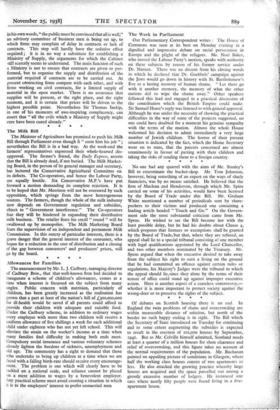No one had any quarrel with the aims of Mr.
Stanley's Bill to exterminate the bucket-shop. Mr. Tom Johnston, however, being something of an expert on the ways of shady financiers, was by no means satisfied. He believed that the firm of Maclean and Henderson, through which Mr. Spiro carried on some of his activities, would have been licensed by the Board of Trade under this Bill. Mr. Graham White mentioned a number of periodicals sent by share- pushers to their victims and produced one containing a leading article headed " Touch and Go." On the Govern- ment side the most substantial criticism came from Mr. Spens. He wished to see the Bill become law with the least possible delay, but he had his doubts about Clause 4, which proposes that licences or exemptions shall be granted by the Board of Trade, but that, where they are refused, an appeal shall lie to a special tribunal consisting of one member with legal qualifications appointed by the Lord Chancellor, and two other members nominated by the Treasury. Mr. Spens argued that when the executive desired to take away from the subject his right to earn a living on the ground that he had committed an offence against certain rules or regulations, his Majesty's Judges were the tribunal to which the appeal should lie, since they alone by the terms of their tenure of office could stand up against improper executive action. Here is another aspect of a ceaseless controversy,— whether it is more important to protect society against the wrong-doer or to preserve the rights of the subject. * * * *














































 Previous page
Previous page